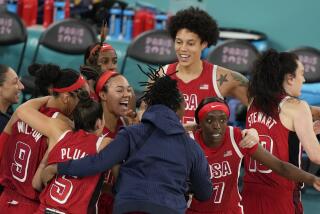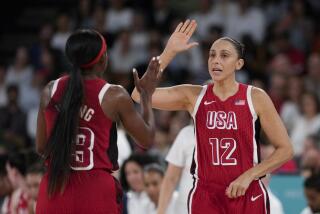U.S. women’s gymnastics team still in first after uneven bars
After building a substantial lead after Jordyn Wieber, Gabrielle Douglas and McKayla Maroney had each vaulted almost as well as they could, the U.S. moved to the uneven bars.
The U.S. completed the apparatus after the Russians. Anastasia Grishina (14.700), Aliya Mustafina (15.700) and Victoria Komova (15.766) were solid, had no falls and only Mustafina had a real wobble during her routine.
Wieber led off for the Americans. In the team qualifying, Wieber had wobbling legs on a handstand and was slow overall. This time Wieber had issues as well, almost losing her grip on a catch move early in the routine and taking an extra step on the landing to score 14.66.
PHOTOS: U.S. athletes most likely to medal
Kyla Ross, the 15-year-old from Aliso Viejo, made her Olympic team debut on the uneven bars and followed Wieber with a routine that had some unsteady early moments but that finished strongly with a secure landing. The routine was scored 14.933. Gabrielle Douglas, nicknamed the “Flying Squirrel” because of her soaring release moves on the uneven bars, also had some early wavers and finished with a score of 15.200.
The U.S. was still in first place overall, after two rotations with a score of 92.931, but the Russians were back in contention with 92.532.
China, the defending team gold medalist, had struggles on the balance beam with Deng Linlin falling off and scoring only 13.766 and Huang Qiushuang nearly leaving the beam.
After the second rotation, the U.S. had 92.931 points and Russia had pulled with 0.399 with a 92.532 total. China was third with 89.331 points.
ALSO:
Missy Franklin gets gold in 100-meter backstrokeU.S. women’s gymnastics team in first place after vault
U.S. officials try not to inflame Ye Shiwen doping allegations
More to Read
Go beyond the scoreboard
Get the latest on L.A.'s teams in the daily Sports Report newsletter.
You may occasionally receive promotional content from the Los Angeles Times.






